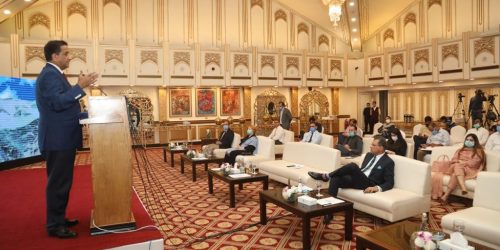July 13, 2020, Islamabad— The Ministry of Climate Change and UNDP hosted a media briefing today to celebrate Pakistan’s achievement of Sustainable Development Goal 13: Climate Action, well before the 2030 deadline. The recent release of the 2020 Sustainable Development Report shows that out of 17 goals, Pakistan has achieved the Climate Action goal under which countries are required to take urgent action to combat climate change and its impacts.
The event was attended by the Prime Minister’s Advisor on Climate Change, Malik Amin Aslam, Additional Secretary Ministry of Climate Change, Joudat Ayaz, Deputy Resident Representative UNDP Pakistan, Aliona Niculita, Assistant Resident Representative Environment & Climate Change Unit UNDP, Amanullah Khan and additional UNDP and Ministry of Climate Change representatives.\
The Prime Minister’s Advisor on Climate Change, Mr. Malik Amin Aslam said at the occasion,“ I would like to highlight that the SDGs are not 17 individual goals, but are rather interconnected. Progress in one goal can both depend on and unlock progress in another – and interconnected goals require an interconnected approach. Our efforts in the realm of climate action can surely help create a positive impact on other goals and countries. Pakistan is the 5th most vulnerable country in the world to climate change. We are committed to this, and have started a number of projects over the past two years, an example being GLOF-II (Glacial Lake Outburst Floods II), where we are working to establish early warning systems and train communities to deal with glacial lake outburst floods.”
“UNDP Pakistan and the Ministry of Climate Change has a long-standing strategic partnership and we are happy to say that our continued collaboration has borne fruit for the people of Pakistan,” said Ms. Aliona Niculita, Deputy Resident Representative, UNDP Pakistan, at the media briefing. “With strong political will, increased investment, use of technology and mutual collaboration, it is evident that we can limit the increase in global mean temperature to two degrees Celsius or less, above the pre-industrial level. This will require collective action, continuous efforts, and meaningful and effective partnerships.”
Across the globe, UNDP has a clear mandate to support countries that are vulnerable to the effects of Climate Change and to help them in achieving the desired goals. In Pakistan, UNDP provided technical support to the Ministry of Climate Change in the achievement of this goal. UNDP has supported the implementation of various national level projects under multiple international environmental protocols thus ensuring that the targets were met as per the government’s commitments. One of the flagship outputs of this partnership is Pakistan’s first National Climate Change Policy, which was developed by the Ministry of Climate Change with the support of UNDP in 2012 followed by a number of flagship projects in the arena of Climate Action.
The Sustainable Development Goals were adopted to address risks across economic, social, and environmental domains. These include poverty, widening inequalities in income and access to decent lives, continued high disease burdens, and massive environmental disasters. UNDP stands committed to work together with the Government of Pakistan, civil society, national partners, and the people of Pakistan to help find solutions to persistent development challenges, including those related to Climate Change.





